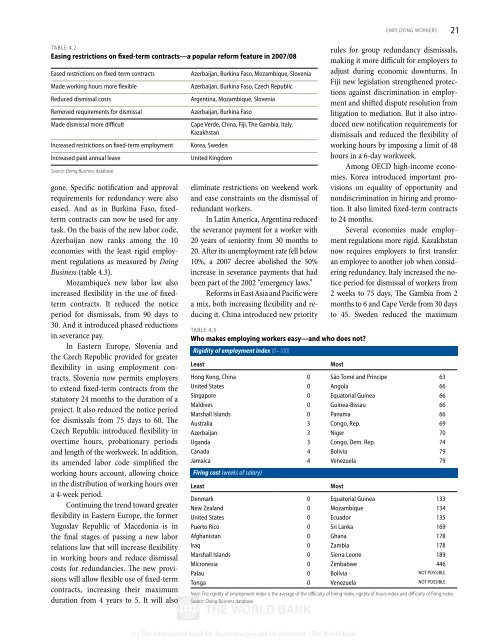20 Doing Business <strong>2009</strong>FIGURE 4.3Rigid labor regulations are associated with high informality and high unemploymentSize of informal sector (% of GDP)Female unemployment (%)302010000Least rigid Most rigid Least rigid Most rigidEconomies ranked byrigidity of employment index, quintilesEconomies ranked byrigidity of employment index, quintilesNote: Relationships are significant at the 1% level for size of the informal sector and at the 10% level for female unemployment, and remainsignificant when controlling for income per capita.Source: Doing Business database; WEF (2007); World Bank, World Development Indicators database.12840develop. Doing Business does not measurecompliance with them, however, and mal sector 7 (figure 4.3). This pattern istions are associated with a larger infor-FIGURE 4.4Most these reforms 8 conventions in Eastern are Europe not reflected & Central in Asia evident in Venezuela and Bolivia. Boththe employing workers Number indicators. of reforms This increasing have flexibility laws that of labor ban regulations dismissing workersby Doing Business report yearyear’s report shows which of the 8 conventionsEurope have been ratified by each of the economies with the most rigid employ-on economic grounds and are among theDB2005 DB2006 DB2007 DB2008 DB<strong>2009</strong>Eastern& 181 Central economies Asia it includes (see table on ment regulations (table 4.1). And both 19(28 economies)ratification status of the 8 ILO conventionsregarding core labor standards, page largest informal sectors (41% of GDP inare among the 5 economies with theOECDhigh income16(24 147). economies) Ratification of the core labor standardsis not necessarily a good indicator In the end, workers in the infor-Venezuela, 43% in Bolivia). 8Sub-SaharanAfrica of compliance. A measure of 4compliancemal sector lose out the most. They are(46 economies)is being developed under the Doing BusinessAmerica project for future inclusion in the no legal protections or social benefits.generally paid lower wages and enjoyLatin& Caribbean3(32 employing economies) workers indicators.The most vulnerable groups, women andGovernments all over the world face young workers, are often at the greatestEast Asia& the Pacific challenge of finding 2 the right balance disadvantage. A study in Indonesia finds(24 economies)between worker protection and labor that if it had enjoyed the same flexibilityin labor regulations as Finland, forSouth market Asia flexibility. Denmark, for example,(8 economies)2seeks to reconcile job flexibility with employmentEast security & through “flexicurity.” have been 2.1 percentage points lowerexample, its unemployment rate mightMiddleNorth Employers Africa face no 1 regulations against and, among young people, 5.8 percentagepoints lower. 9(19 economies)laying off workers for economic reasons.Note: A reform is counted as 1 reform per reforming economy per year.Source:TheyDoingonlyBusinessprovidedatabase.advance notice. More Finding the right balance can be difficult,but the quest is worth it. Anotherthan 80% of workers belong to a voluntaryunemployment 4.1insurance scheme. 5 recent study looks at the effects of laborFIGUREEconomies Workers benefit with rigid from labor the flexible regulations regulations,entry which rate, 2000–04 give them (%) the opportunity data for 10,396 firms in 14 index countries. in DB200510have fewer regulation business in start-ups Latin America, using surveyRigidity of employmentAverage15 for a job in the formal sector and easy Firms were asked how many permanent 45transitions from one job to another. Indeed,more than 70% of Danes think it is they would dismiss if labor regulationsworkers they would hire and how many10 good to change jobs frequently. 6were made more flexible. The analysis 30But in developing countries especially,regulators often err to one exeragenet increase of 2.1% in total jobs.suggests that the result would be an avtreme—pushing5employers and workers Firms with fewer than 20 employees benefitthe most, with average gains of 4.2%.15into the informal sector. Across developingeconomies, overly rigid labor regula-Flexible labor regulations also encourageentrepreneurship. Two recentstudies suggest that flexible regulationsincrease the probability of start-ups byabout 30%. 11 The researchers offer 2 explanations.For employees, lower job securitymakes starting their own businessattractive. For entrepreneurs, the greaterflexibility in running a business makesbusiness ownership more attractive.Reforms making labor regulationsmore flexible also may increaseindustrial production and reduce urbanunemployment. In the Indian states ofAndhra Pradesh and Tamil Nadu suchreforms increased manufacturing outputby 15%. In West Bengal, by contrast,reforms making labor regulations morerigid cut output by 20%. 12 The estimatedFIGURE 4.5Top result: 4 reform 1.8 million features more in urban poor inemploying West Bengal. workers 13Reforms including feature since DB2005 (%)Who reformed in 2007/08? 36%Made working hours more flexibleFifteen economies made significantchanges to their labor regulations 29% inEased 2007/08. restrictions Six economies fixed-term increased contracts flexibility;9 reduced it. Eastern Europe and15%Central Asia introduced the most reformsincreasing flexibility, followed byReduced dismissal costsAfrica and 11% Latin America and the Caribbean(table requirements 4.2). for dismissalsRemovedBurkina Faso was the most activeNote: reformer, A may adopting include several a new reform labor features. code thatSource: Doing Business database.replaced its 2004 code. Employees andemployers can now determine the weeklyrest day without having to seek the approvalof the authorities. And employersmay be encouraged to take greaterrisks in hiring new workers thanks toincreased flexibility in using fixed-termcontracts and less rigid dismissal procedures.FIGUREFor4.2example, strict priority rules,Rankings on employing workersincludingare basedseniority,on 4 subindicatorsno longer apply indismissing workers for redundancy.Fixed-term contracts, Nonstandard work schedules,minimum Azerbaijan wage was the second paid vacation most daysactiveregulationsreformer. Working hours became25% 25%more flexible, Difficulty with restrictions Rigidity on nightwork now of applying hiring of only hourswhere laborindex indexconditions are hard or hazardous. Before25% 25%the reform, an employer could dismissDifficulty Firinga worker for of economic firing cost reasons only ifindexthe worker could not be reassigned toMandatory legalrequirements for dismissalsfor economic reasonsanother position. That requirement isNew Zealand Slovakia Sweden Norway Georgia Germany Bolivia PeruNote: See Data notes for details.(c) The International Bank for Reconstruction and Development / The World BankSource: Doing Business database; Djankov, Ganser, McLiesh, Ramalho and Shleifer (2008).As weeks of salary;includes notice periodand severance payments
Employing workers 21Table 4.2Easing restrictions on fixed-term contracts—a popular reform feature in 2007/08Eased restrictions on fixed-term contractsMade working hours more flexibleReduced dismissal costsRemoved requirements for dismissalMade dismissal more difficultIncreased restrictions on fixed-term employmentIncreased paid annual leaveSource: Doing Business database.gone. Specific notification and approvalrequirements for redundancy were alsoeased. And as in Burkina Faso, fixedtermcontracts can now be used for anytask. On the basis of the new labor code,Azerbaijan now ranks among the 10economies with the least rigid employmentregulations as measured by DoingBusiness (table 4.3).Mozambique’s new labor law alsoincreased flexibility in the use of fixedtermcontracts. It reduced the noticeperiod for dismissals, from 90 days to30. And it introduced phased reductionsin severance pay.In Eastern Europe, Slovenia andthe Czech Republic provided for greaterflexibility in using employment contracts.Slovenia now permits employersto extend fixed-term contracts from thestatutory 24 months to the duration of aproject. It also reduced the notice periodfor dismissals from 75 days to 60. TheCzech Republic introduced flexibility inovertime hours, probationary periodsand length of the workweek. In addition,its amended labor code simplified theworking hours account, allowing choicein the distribution of working hours overa 4-week period.Continuing the trend toward greaterflexibility in Eastern Europe, the formerYugoslav Republic of Macedonia is inthe final stages of passing a new laborrelations law that will increase flexibilityin working hours and reduce dismissalcosts for redundancies. The new provisionswill allow flexible use of fixed-termcontracts, increasing their maximumduration from 4 years to 5. It will alsoAzerbaijan, Burkina Faso, Mozambique, SloveniaAzerbaijan, Burkina Faso, Czech RepublicArgentina, Mozambique, SloveniaAzerbaijan, Burkina FasoCape Verde, China, Fiji, The Gambia, Italy,KazakhstanKorea, SwedenUnited Kingdomeliminate restrictions on weekend workand ease constraints on the dismissal ofredundant workers.In Latin America, Argentina reducedthe severance payment for a worker with20 years of seniority from 30 months to20. After its unemployment rate fell below10%, a 2007 decree abolished the 50%increase in severance payments that hadbeen part of the 2002 “emergency laws.”Reforms in East Asia and Pacific werea mix, both increasing flexibility and reducingit. China introduced new priorityTable 4.3Who makes employing workers easy—and who does not?Rigidity of employment index (0–100)Leastrules for group redundancy dismissals,making it more difficult for employers toadjust during economic downturns. InFiji new legislation strengthened protectionsagainst discrimination in employmentand shifted dispute resolution fromlitigation to mediation. But it also introducednew notification requirements fordismissals and reduced the flexibility ofworking hours by imposing a limit of 48hours in a 6-day workweek.Among OECD high-income economies,Korea introduced important provisionson equality of opportunity andnondiscrimination in hiring and promotion.It also limited fixed-term contractsto 24 months.Several economies made employmentregulations more rigid. Kazakhstannow requires employers to first transferan employee to another job when consideringredundancy. Italy increased the noticeperiod for dismissal of workers from2 weeks to 75 days, The Gambia from 2months to 6 and Cape Verde from 30 daysto 45. Sweden reduced the maximumMostHong Kong, China 0 São Tomé and Principe 63United States 0 Angola 66Singapore 0 Equatorial Guinea 66Maldives 0 Guinea-Bissau 66Marshall Islands 0 Panama 66Australia 3 Congo, Rep. 69Azerbaijan 3 Niger 70Uganda 3 Congo, Dem. Rep. 74Canada 4 Bolivia 79Jamaica 4 Venezuela 79Firing cost (weeks of salary)LeastMostDenmark 0 Equatorial Guinea 133New Zealand 0 Mozambique 134United States 0 Ecuador 135Puerto Rico 0 Sri Lanka 169Afghanistan 0 Ghana 178Iraq 0 Zambia 178Marshall Islands 0 Sierra Leone 189Micronesia 0 Zimbabwe 446Palau 0 Bolivia not possibleTonga 0 Venezuela not possibleNote: The rigidity of employment index is the average of the difficulty of hiring index, rigidity of hours index and difficulty of firing index.Source: Doing Business database.(c) The International Bank for Reconstruction and Development / The World Bank
















